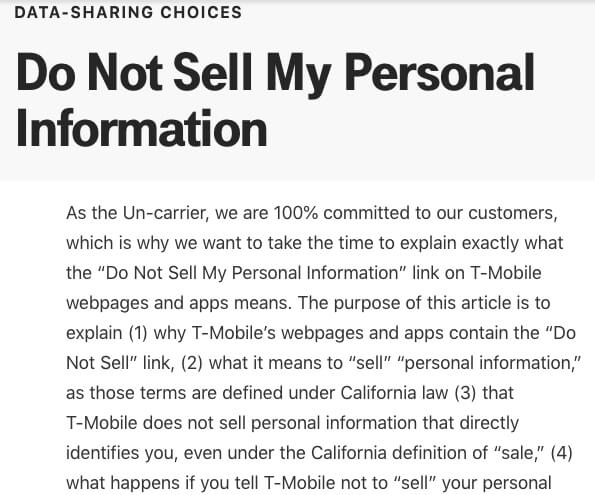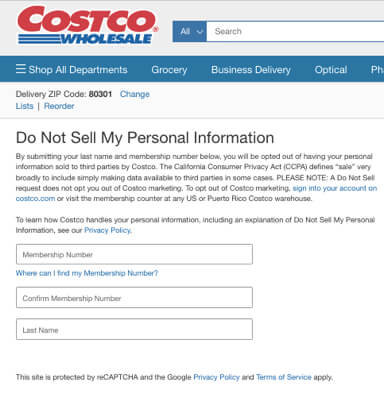
Wondering about those suddenly ubiquitous links and pages on websites saying “Do Not Sell My Personal Information”? If so, you may want to know, first, what those Do Not Sell My Personal Information links and pages are all about, second, why they are showing up now, and third, does this mean that those sites were selling your personal information all along?
The answer to the third question is easy: of course they were. And continue to do so. After all, selling your personal data is not only big business, for many sites its really their primary (if not only) business. Some are more up front about it (such as People Data Labs who suffered a huge breach of people’s personal data – most likely including your own), but nearly all of them do it in some form, on some level and scale.
So let’s focus on the first two questions: What are all these Do Not Sell My Personal Information links and pages about?
And why are they showing up now?
First, here are a few examples of these links and the text of the pages to which they link.
The Internet Patrol is completely free, and reader-supported. Your tips via CashApp, Venmo, or Paypal are appreciated! Receipts will come from ISIPP.
From T-Mobile:
Do Not Sell My Personal Information
As the Un-carrier, we are 100% committed to our customers, which is why we want to take the time to explain exactly what the Do Not Sell My Personal Information link on T-Mobile webpages and apps means. The purpose of this article is to explain (1) why T-Mobiles webpages and apps contain the Do Not Sell link, (2) what it means to sell personal information, as those terms are defined under California law (3) that T-Mobile does not sell personal information that directly identifies you, even under the California definition of sale, (4) what happens if you tell T-Mobile not to sell your personal information, (5) how T-Mobile implements your choice to block it from selling your personal information, and (6) how T-Mobile maintains your Do Not Sell Choice.
From The Atlantic:
Do Not Sell My Personal Information
This notice and the options below apply only to California residents.
If you are a California resident, the California Consumer Privacy Act (CCPA) provides you with the right to opt out of the sale of your Personal Information.
Please review our Privacy Policy for a more detailed description of how we collect, use, and share the Personal Information of California residents in operating our business; your privacy rights as a California resident; and how to exercise your rights as a California resident. For the purposes of this notice, Personal Information has the meaning given in the CCPA, but does not include information exempted from the scope of the CCPA.
And from Costco (Costco’s is the most straightforward, it must be said):
Do Not Sell My Personal Information
By submitting your last name and membership number below, you will be opted out of having your personal information sold to third parties by Costco. The California Consumer Privacy Act (CCPA) defines sale very broadly to include simply making data available to third parties in some cases. PLEASE NOTE: A Do Not Sell request does not opt you out of Costco marketing. To opt out of Costco marketing, sign into your account on costco.com or visit the membership counter at any US or Puerto Rico Costco warehouse.
To learn how Costco handles your personal information, including an explanation of Do Not Sell My Personal Information, see our Privacy Policy.
Costco’s straightforward and short DNSMPI page
As you may have gathered from the mention of it above, this all goes back to the California Consumer Privacy Act (CCPA) (which we have covered in depth here), which was enacted in 2018, and went into effect a short while ago, on January 1, 2020.
Among other things, the CCPA mandates that California consumers have the right to opt out of a business selling their personal, private information. This means that any business that does business in California (which basically all Internet-based businesses in the U.S. do, or at least have the potential to do) is required to a) advise consumers that they sell the personal information that they collect, and b) advise the consumer that they a right to opt out of having their personal information sold, and provide them with a way to do so.
In addition, the CCPA requires that businesses must provide a clear and conspicuous link on the business’ homepage, and that link must be titled “Do Not Sell My Personal Information”, with the link going to a page that allows the consumer to easily opt out of the sale of their personal information.
So there you have it. This is why suddenly all of these links and pages are cropping up everywhere. It’s not because these businesses are suddenly selling your personal information and offering you a way to opt out. And it’s certainly not because they suddenly collectively developed a conscience. It’s because these businesses, who were already selling your personal data, are now required by law to provide you with an easy way to stop them from selling your personal data.
The Internet Patrol is completely free, and reader-supported. Your tips via CashApp, Venmo, or Paypal are appreciated! Receipts will come from ISIPP.













Another useful tip from TIP. But I think you meant “And it’s certainly NOT because they suddenly collectively developed a conscience.”
Whoops, good catch, thank you!
So, if you’re NOT in California, can you still opt out this way?
There is certainly nothing on any site of which we are aware to keep you from opting out that way!